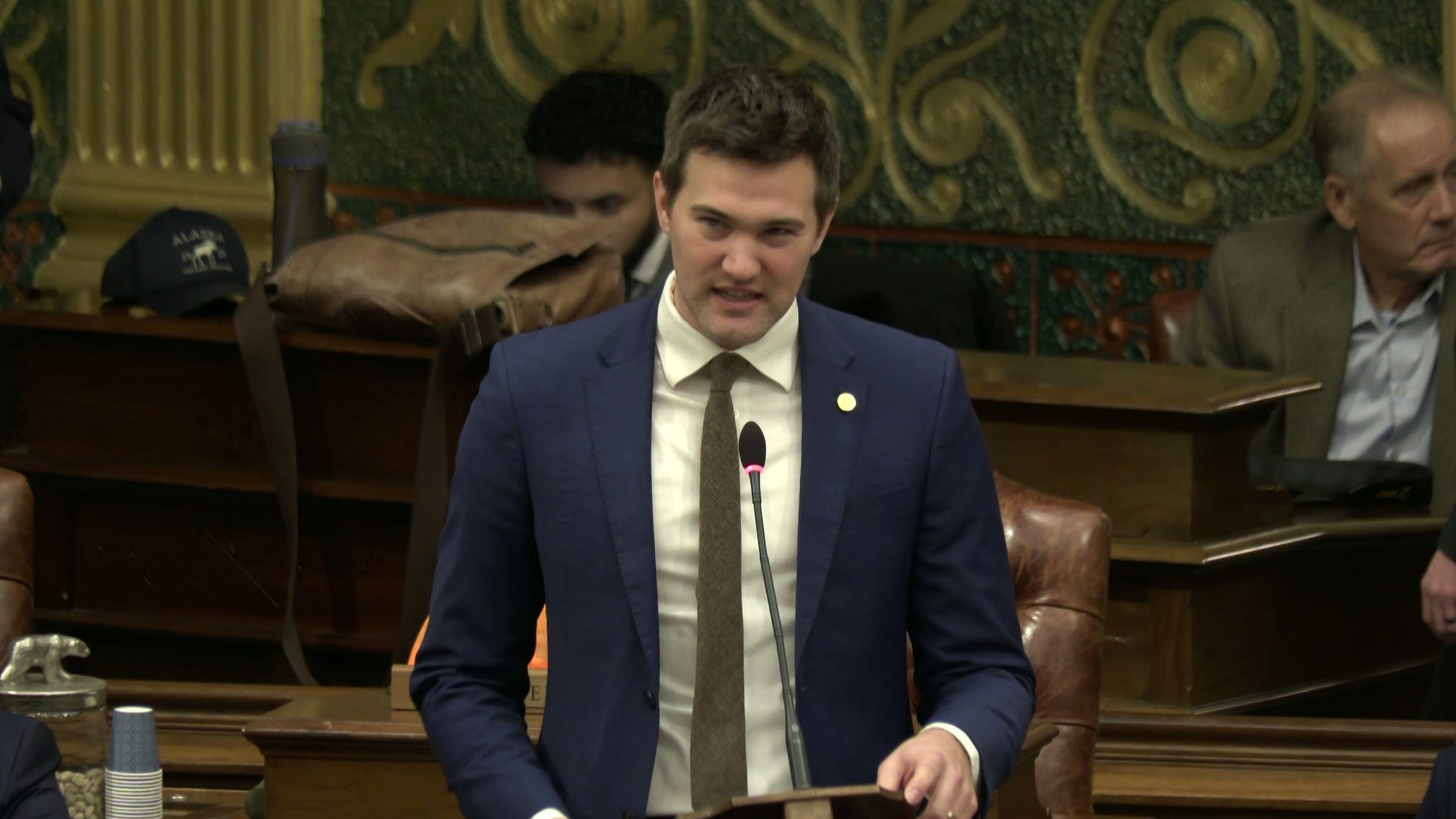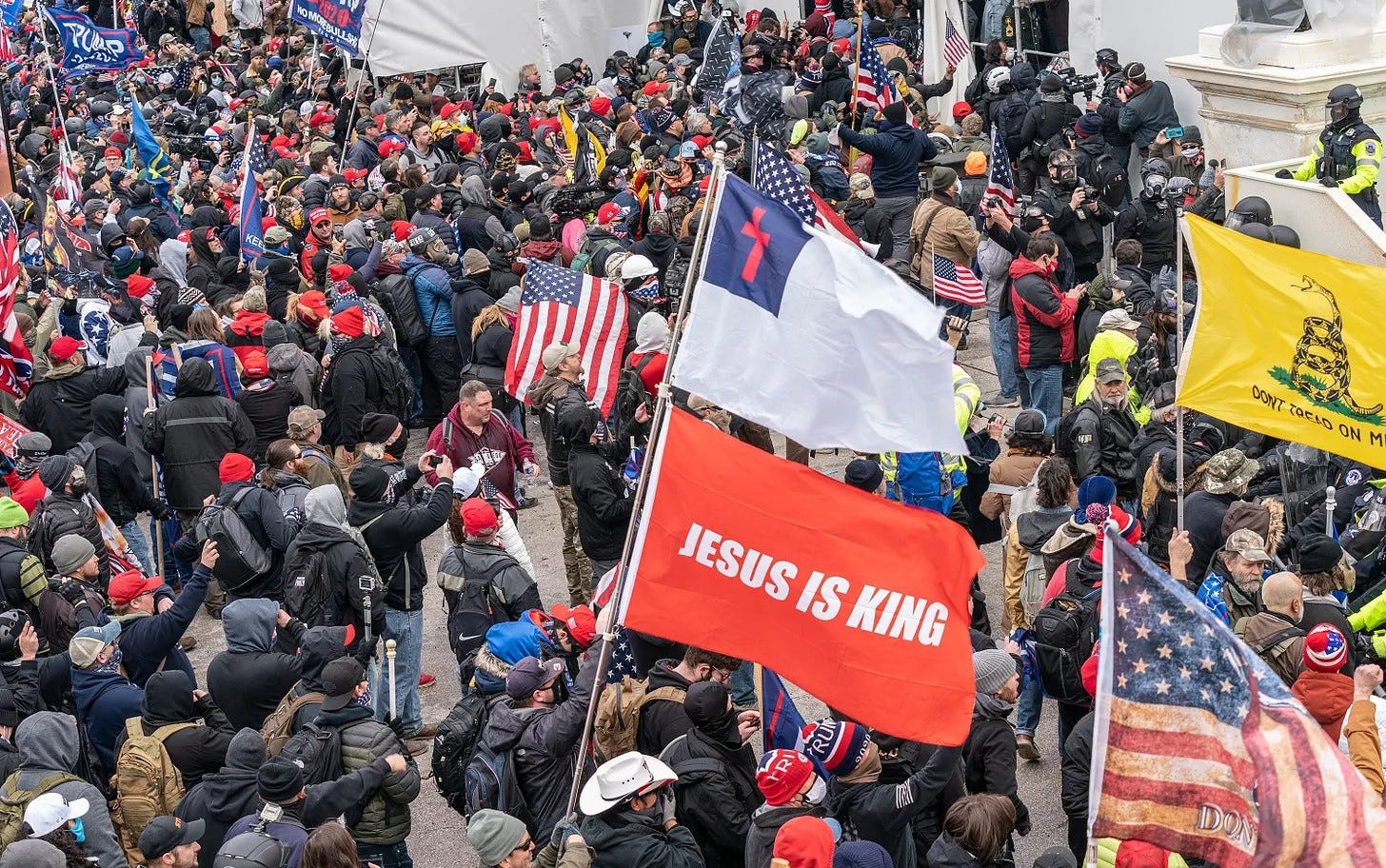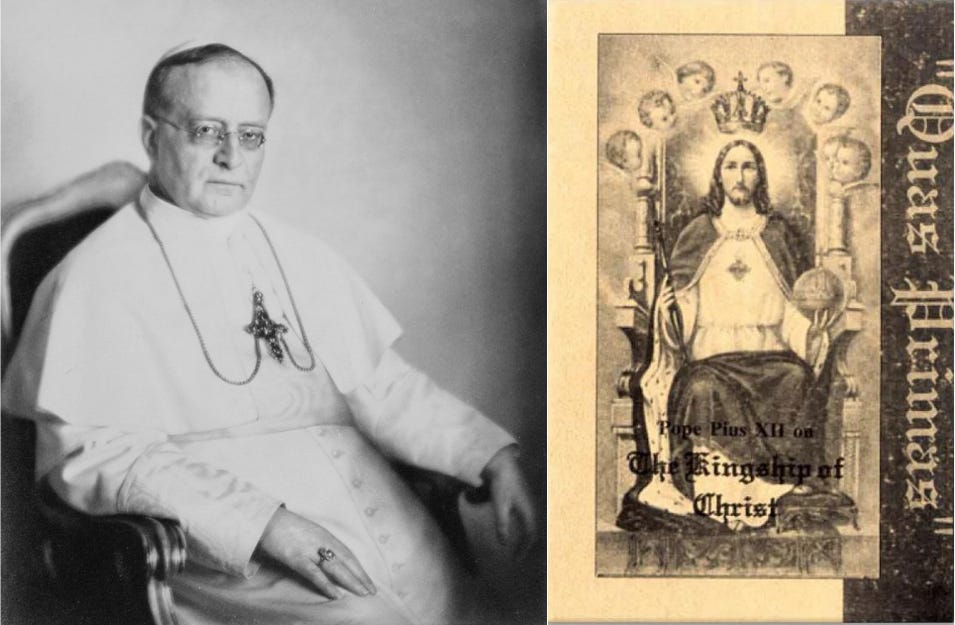Christ the Christian Nationalist Sunday?
On Thursday (Nov. 13), the Michigan House of Representatives passed a resolution to officially declare Nov. 23 as “Christ the King Sunday” in the Mitten State. The resolution, which passed without debate on a voice vote that did not seem to draw any opposition, declares that the lawmakers “honor and acknowledge Christ’s Kingship within every aspect of life.”
“We encourage Michiganders to join in reflection, service, and acts of kindness that honor the moral and spiritual values exemplified by Christ the King,” the resolution adds.
The resolution also quotes Daniel 7:14, but with an edit to insert the word “Christ” into the verse written centuries before the birth of Jesus. The passage declares that the “son of man” will have “dominion” over all nations.
Republican state Rep. Josh Schriver, who sponsored the resolution, declared in his brief remarks in the House chamber that Christ the King Sunday is a time “to remember that moral truth stands above political power.” He added that the day should remind people that “freedom depends on something deeper than government. It depends on the conscious virtue of its citizens and our bedrock of faith.” Schriver therefore insisted our public life and the lawmakers in the chamber need “a unity like no other in him.”
Despite his rhetoric about unity, Schriver’s a controversial far-right politician. He defended as “patriots” the fake electors in Michigan who tried to overturn Donald Trump’s 2020 loss in the state. He voted against an effort to recognize Juneteenth as a state holiday, voted against a ban on child marriage, and voted against several bills to address child sexual abuse in the aftermath of the conviction of Larry Nassar for sexually assaulting gymnasts and other young girls in Michigan. He’s also attacked transgender rights, called for same-sex marriage to be “illegal again,” and urged a ban on birth control.

In addition to releasing Christian rap songs (I’m sadly not making that up), Schriver as a lawmaker has pushed White Christian Nationalism, trying to remove the tax-exempt status of groups he disagrees with religiously and insisting God elects lawmakers and thus he must “work for God and not for man.” He’s pushed such ideas on numerous conservative platforms, including on the podcast of Jack Posobiec, a rightwing pundit who works with Turning Point USA (founded by Charlie Kirk) and who spread debunked Pizzagate claims that there’s a Satanic pedophile ring tied to Hillary Clinton in the basement of a pizza restaurant that doesn’t even have a basement. Schriver also sparked controversy by affirmingly sharing Posobiec’s promotion of the “great replacement theory,” a racist, antisemitic far-right conspiracy theory which is pushed in multiple mass shooter manifestos.
In April of this year, Schriver converted to Catholicism (from a Protestant background). As noted in his resolution and his remarks on the floor, the Christ the King Sunday was first introduced 100 years ago by a Catholic pope. But today it’s also celebrated in numerous Protestant traditions.
Many pastors who have spoken against Christian Nationalism will use this coming Sunday as another time to remind people of the dangers of that ideology which shifts our allegiance from the Kingdom of God to a nation. While that seems like a natural implication from declaring “Christ is King,” a Christian Nationalist politician just got the Michigan House to recognize the liturgical day. And that tension actually goes back to the start of this focus in churches a century ago. So this issue of A Public Witness looks at the not-so-immaculate conception of Christ the King Sunday and the theological conflict today between different visions of Christ as King.
In the First
In 1925, Pope Pius XI created a new feast for the Catholic Church. He announced the Feast of Christ the King with his encyclical Quas Primas (“In the First”). Initially, it was observed on the last Sunday of October, making it the Sunday just before All Saints’ Day on Nov. 1. However, Pope Paul V in 1969 moved it to the last Sunday in the liturgical year and thus just before the first of Advent. That means it now lands between Nov. 20-26.
Several other traditions now also observe Christ the King Sunday (or Reign of Christ Sunday) at the end of the liturgical year, including the Anglican Communion, Evangelical Lutheran Church in America, Presbyterian Church (U.S.A.), United Church of Christ, and United Methodist Church, and united Protestant denominations in Australia, Canada, India, and elsewhere.
But while many traditions have embraced a service centered on the theological claim of Christ as King, the document that launched this liturgical focus remains largely ignored. It’s actually a text which aligns with the new effort in Michigan since Pope Pius XI pushed a Christian Nationalistic vision as he urged a Feast of Christ the King.
The historical context of the encyclical helps explain the pope’s worries. Europe was just a few years removed from the bloodbath of “the Great War” we now call World War I. That war and several revolutions from 1917-1923 sent multiple kingdoms across Europe into the history books.
Additionally, the papacy was in a difficult transition time politically. A few years after his encyclical on Christ the King, Pius negotiated a treaty with Benito Mussolini’s Italian government that ended decades of disputes after Italy had seized papal territories. The treaty recognized Vatican City as an independent nation, thus making Pius the first pope to serve as a head of state since the fall of the Papal States in 1870. While Pius privately worried about Mussolini’s megalomania and embrace of Adolf Hitler, publicly he remained aligned with Mussolini’s Fascist regime and shared Mussolini’s vision of an anti-democratic, authoritarian state.
Amid concerns about rising secularism and anti-Catholic governments, Pius released Quas Primas and launched a liturgical focus on Christ the King. Yet, part of his solution to the ills in Europe and beyond was Christian Nationalism. Insisting there’s no difference when considering an individual or the state, Pius wrote that a state must also be “under the dominion of Christ” and “in him is the salvation of society.” He lamented that many countries had moved away from that medieval model uniting church and state.
“The empire of Christ over all nations was rejected. The right which the Church has from Christ himself, to teach mankind, to make laws, to govern peoples in all that pertains to their eternal salvation, that right was denied,” he argued. “If, therefore, the rulers of nations wish to preserve their authority, to promote and increase the prosperity of their countries, they will not neglect the public duty of reverence and obedience to the rule of Christ.”
Pius particularly framed the idea of a nation recognizing Christ as a key to law and order that upholds the status quo political power of the ruler.
“When once men recognize, both in private and in public life, that Christ is King, society will at last receive the great blessings of real liberty, well-ordered discipline, peace and harmony. Our Lord’s regal office invests the human authority of princes and rulers with a religious significance; it ennobles the citizen’s duty of obedience,” he argued. “The result will be a stable peace and tranquility, for there will be no longer any cause of discontent. Men will see in their king or in their rulers men like themselves, perhaps unworthy or open to criticism, but they will not on that account refuse obedience if they see reflected in them the authority of Christ God and Man. Peace and harmony, too, will result; for with the spread and the universal extent of the kingdom of Christ men will become more and more conscious of the link that binds them together, and thus many conflicts will be either prevented entirely or at least their bitterness will be diminished.”
To help accomplish all of this, Pius proposed the Feast of Christ the King, insisting it would help a “Christian society” for which “it is necessary that the kingship of our Savior should be as widely as possible recognized and understood.”
“We firmly hope, however, that the feast of the Kingship of Christ, which in future will be yearly observed, may hasten the return of society to our loving Savior. It would be the duty of Catholics to do all they can to bring about this happy result,” he explained. “If the faithful were generally to understand that it behooves them ever to fight courageously under the banner of Christ their King, then, fired with apostolic zeal, they would strive to win over to their Lord those hearts that are bitter and estranged from him, and would valiantly defend his rights.”
“Nations will be reminded by the annual celebration of this feast that not only private individuals but also rulers and princes are bound to give public honor and obedience to Christ,” he added. “It will call to their minds the thought of the last judgment, wherein Christ, who has been cast out of public life, despised, neglected and ignored, will most severely avenge these insults; for his kingly dignity demands that the State should take account of the commandments of God and of Christian principles, both in making laws and in administering justice, and also in providing for the young a sound moral education.”
No Kings?
Lutheran minister and journalist Angela Denker noted last year for Christ the King Sunday that the day “might just be the most important Sunday of the Church Year in an age of rising Christian Nationalism.” She explained the focus “offers us a critical reminder, a chance to say that if we cry out that Jesus is Lord, we must at the same time reject all earthly forms of royalty and political might. We must lift up the Way of nonviolence and compassion, and remember that our king rides in not on a chariot but on a lowly donkey (or maybe a colt?).”
That’s a good message for churches, but there’s another theme also rising from the crowd. We see a Christian Nationalist politician like Rep. Josh Schriver in Michigan lift up the same liturgical day as he advocates for Christian Nationalism in ways that aren’t too dissimilar from Pope Pius XI’s philosophy. Schriver frequently invokes the Kingship of Christ to justify his own Christian Nationalism and partisanship. Like on the Fourth of July this year when he argued that “America’s rebirth” today must be made “in the name of our King and God, Jesus Christ!” Or earlier this year when he urged people to pray for Jesus to keep protecting Trump, adding that “Jesus Christ is King of America, after all!”
Schriver is, unfortunately, not an outlier. Outside the U.S. Capitol on Jan. 6, 2021, a group of young men waved “America First” flags while chanting “Christ is King!” shortly before the pro-Trump crowd stormed the building in hopes of blocking Trump’s electoral defeat. The group mixing “America First” and “Christ is King” were followers of far-right commentator Nick Fuentes, a controversial antisemitic Catholic Christian Nationalist. Fuentes, who argues the U.S. is “a Christian nation,” pushes the “Christ is King” slogan to support his White Christian Nationalist vision.
Other extremists and antisemitic figures also often post “Christ is King” on social media, meaning the growing popularity online of the phrase is occurring because of those also pushing hateful politics. And a Christian Nationalist conference earlier this year was held with the theme, “Christ is King: How to Defeat Trashworld!” It included prominent Christian Nationalist speakers like Steve Deace, Andrew Isker, Calvin Robinson, Joel Webbon, and Stephen Wolfe.
Christian Nationalism co-opts what is sacred, twisting it to serve profane political power. They misuse the Bible, Christian music, and the practices of baptism and communion. So it’s no surprise to see a theological declaration like “Christ is King” also being used not to lift up Christ but to advance racist, antisemitic politics. That means it’s not enough to just declare, “Christ is King” on Christ the King Sunday. Without unpacking such a statement, it could reaffirm those in the pews who follow Fuentes or other Christian Nationalists. And without building a theological foundation of how Christ’s Kingship can resist efforts to create a Christian Nationalist king today, simply saying the statement in church could instead inadvertently make people vulnerable to following other voices who loudly shout the phrase while pushing a Christian Nationalist “America First” agenda.

There could be a temptation to simply skip Christ the King Sunday given the political theology of Pope Pius XI, the use of the day by Rep. Schriver, and the parroting of the phrase by Fuentes and others. Or all of that might instead give even more reasons for pastors like Denker who oppose Christian Nationalism to reclaim what it can mean to declare, “We have no king but Christ.” And maybe it can serve as a reminder of the danger of kings. That’s a point Diana Butler Bass, who confessed she’s “not a fan of the Feast of Christ the King,” hopes can be taught through this liturgical focus.
“Christians haven’t done well with kingship — not in history and not now. We’ve far too often desired our own Jesus-Caesar to kick earthly kings and emperors in the teeth. We’ve wanted our Jesus, our vision of Christ, to triumph politically and execute not justice but vengeance. Too many Christians desire an ecclesiastical pyramid of power to rule over the world,” she explained. “God never wanted us to have kings. And any celebration of Christ the King needs always to be an invitation into the work of sacred deconstruction of one of humanity’s worst ideas.”
That’s a truth that could’ve been preached a century ago as Mussolini and Hitler rose to power. And it’s a truth still needed today.
As a public witness,
Brian Kaylor




The knee-jerk "Christ is King" proclamations of Christian Nationalism could also, at least in part, be a response to all the "No Kings" demonstrations that have taken place almost every Saturday since Trump took office. Maybe these protests need to be renamed since this counter slogan has arisen?
Also, the third largest spiritual denomination in America today is the "nones"---those who believe that "freedom OF religion" necessarily also means "freedom FROM religion". I am a religious United Methodist, and that affiliation is precious to me, and I will not disavow it. But it never enters my mind that others, even within United Methodism, or any other religion, do/should/must believe as I believe.
By far the largest and most effective spiritual movement in America for a long time has been Alcoholics Anonymous and all its various offshoots. AA asks only that its adherents acknowledge the presence and help of a "higher power" [as you understand it]. No creed. No compulsion to "believe in" something outside your own understanding. But the assurance that if you join AA and "work the program" you will always have the comfort and support of others like yourself, without shame or blame, no matter how many times you need to "go away" and "come back". That system has "saved" millions more that any other religious "brand" in America.
Perhaps the whole idea of religion itself needs to be rethought?